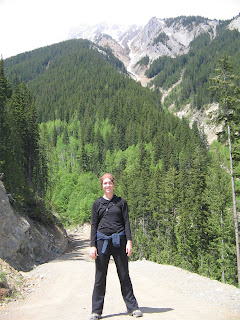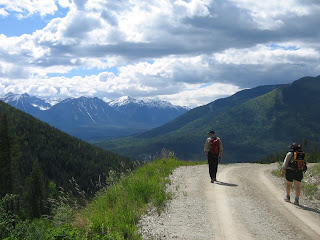
One of my last errands in Mae Sot was getting my head shaved. It had been more than four years since the last time I had done it and I figured my opportunities were only diminishing with time. After all, I can't put off getting a real job forever and it can be quite difficult to get people to take you seriously when you're a young woman with no hair.
Apparently it can also be difficult to get people to make you a young woman with no hair. I went to three salons and got the same response each time. Since my Thai vocabulary doesn't encompass conversations related to head shaving, I just found the clippers amoungst the hair things and did a miming routine. Each time it was greeted with horror and a vehmenant: “Mai chai, mai dai, mae rue!” Roughly translated, this means, “I can't, I won't, it can't be done!” To this I replied, “You can, you will, you will do!” To no avail.
Eventually I liberated myself from my locks at my favorite barbershop where I have taken many male friends for a shave and a haircut. Though surprised to find a woman in his chair and doubtful of my request, I got what I wanted.
I appreciated my new haircut almost immediately. Of course, its nice not to have to worry about sweaty disgusting hair when you are sweating with a fever but as soon as the dengue was gone and we were out in the mountains, the lack of hair really began to work to my advantage.
The trail, for us, started in Besi Sehar, because that is where my boyfriend Jason, began his trek around the Annapurna Circuit eight years ago when the town was nothing but a single strip of dirt road and some shops. It's developed quite considerably since then, he says. Although the paved road ends in Besi Sehar, it is possible to take a jeep further along, through another few towns.
 If I write about the whole trip and if you read it all, I am sure you will tire quite quickly of my overuse of the word “beautiful.” But it was impossible for me to grow accostomed to the beauty I saw in that country. The first day began with the warm morning sun falling obliquely through stands of bamboo trees and across golden terraces of rice paddy ripe for harvest. Every morning brought us something new though, as if the whole word were unfolding and recreating itself around us day by day, or as if we were only beginning to open our eyes and explore it.
If I write about the whole trip and if you read it all, I am sure you will tire quite quickly of my overuse of the word “beautiful.” But it was impossible for me to grow accostomed to the beauty I saw in that country. The first day began with the warm morning sun falling obliquely through stands of bamboo trees and across golden terraces of rice paddy ripe for harvest. Every morning brought us something new though, as if the whole word were unfolding and recreating itself around us day by day, or as if we were only beginning to open our eyes and explore it.Nepal is a country of suspension bridges and it really is amazing how much work the government has put into developing this important aspect of the country's transportation system, especially considering that in remote areas, all the materials for the construction of these great metal spans has to be brought in on the back of a human or a mule, sometimes for great distances over high mountains.
Our first encounter with a bridge, however, was not one of the sturdy metal suspension bridges that span chasms and canyons, but a small bamboo bridge over a shallow stream. The next morning I spent a lot more time carefully packing my bag to make sure it was better balanced and the straps were properly done, but that first day, in the rush of setting out, things were off. Which is how I came to find myself crawling on my hands and knees over a rickety bamboo bridge with a serious tilt to the right while my bag threatened to tip me over in the same direction.
We ate lunch in a beautiful open field full of golden grass, eating chapatis and potato curry with our socks off in the sun.
Its amazing what your mental state can do for your health. Because of all the beauty around me and the happiness I felt each and every day, I can honnestly say that the hiking and the climbing proved far less difficult for me than I had anticipated. I felt very little pain.
 But that first day, my mental state worked against me. In the afternoon, the trail dwindled to a tiny goat track where we were forced to perch precariously as mule trains shouldered past us. We climbed and climbed and climbed and our climbing brought us to amazing terraced rice feilds, stacked one upon the other on impossibly steep slopes. As the afternoon aged, the sunlight grew more mellow and the light fell lovingly across the hills, enhancing colors that were like clear deep notes in a symphony.
But that first day, my mental state worked against me. In the afternoon, the trail dwindled to a tiny goat track where we were forced to perch precariously as mule trains shouldered past us. We climbed and climbed and climbed and our climbing brought us to amazing terraced rice feilds, stacked one upon the other on impossibly steep slopes. As the afternoon aged, the sunlight grew more mellow and the light fell lovingly across the hills, enhancing colors that were like clear deep notes in a symphony.We spotted a village far in the distance, up higher and probably about a thirty minute walk from where we were and we told ourself that it was our destination for the day. Of course, when we reached that village, it wasn't our destination at all, nor could our destination be seen. Eventually, we did spot another village, which surely, I thought, must be our destination. Of course, it wasn't. Ours was higher still.
It's funny how when you settle yourself into a slow rythym with a distant goal, it feels like you can go forever and suddenly you find yourself at the end of your day as if it were almost effortless. But sometimes when you feel like you are so close, those steps can drag on forever. Especially when you keep being so close so many times, only to have to keep picking up your pack and continuing onwards.

The final stretch of trail before our first stop was an incredibly steep incline on a dusty hill crisscrossed with switchbacks. Compared to the hikes we had ahead of us, I see now that it was almost nothing, but it was probably my most challenging part of the hike. I was tired and sore and dusty and very glad to make it to the top.
Already that night, the cold began. Although it wasn't nearly as cold as it would become, I still wore my jacket after the sun went down and had a quick shower.
After leaving Besi Sehar, every guesthouse, lodge and hostel we passed advertised the wonders of its solar hot shower. My favorite signs said: “24 hour hot solar shower available!”
The thing with solar showers is that the sun only hits them for a certain part of the day and warms a certain amount of water which only stays warm for a certain part of the day. If you hit the showers after a trekking group has been through, or late at night, forget about it.
 I saw women walking that trail with beautiful long hair and I didn't regret my haircut for a moment. I was in and out of those mostly cold showers as long as we could bear to have them and glad that I could dry off and get warm as quickly as possible.
I saw women walking that trail with beautiful long hair and I didn't regret my haircut for a moment. I was in and out of those mostly cold showers as long as we could bear to have them and glad that I could dry off and get warm as quickly as possible.On this first section of the trail, we didn't encounter many trekkers. The path we walked was fairly narrow, winding its way gently along hillsides terraced with rice.
On our third day of hiking I hit another challenge: I had my first low blood sugar. My pack was full of fast acting glucose tablets as well as granola bars and jelly beans that my boyfriend kept eyeing now and again. We had a long climb that morning among rocks and apart from feeling my muscles get tired, I started to feel strange.
What frustrated me was that I wasn't far from the top of the hill, where I knew Jay would be waiting for me. However there was no way I could physcially walk to the top of the hill. When my body speaks, I have no choice but to listen. I had to swallow my frustration and put down my pack on a nearby flat rock, pull out the sugar and a granola bar and enjoy the morning sunshine and the beautiful day. Every time a hiker passed me on the hill, I itched to join them. But I sat and waited.
It normally takes about ten minutes for fast acting sugar to get in the bloodstream and fix a low blood sugar but I was exercising, which means my sugar levels would continue dropping while I sat and ate, and continue dropping if I continued exercising. Twenty minutes later, I shouldered the pack and started up the hill, my physical limitations tainting my mood.
But just over the hill after that one, we passed through an archway announcing our entry into the district of Manang and the town of Tal.
 We had been in the valley until then, amidst dense trees, in a world that was full of green things and sunlight and shadows. We stopped through the archway and suddenly the world opened up before us in silver and shining grey and the most startling aqua blues. The tiny town of Tal sits on the bend of an alluvial flood plain. The glacial waters of the river are a brilliant blue, the misty waterfall behind the town a soft white. The trail is built out over the water hugging a cliff at one point before it finds the town and passes between stone houses and a closed building painted with a promise of Fosters beer.
We had been in the valley until then, amidst dense trees, in a world that was full of green things and sunlight and shadows. We stopped through the archway and suddenly the world opened up before us in silver and shining grey and the most startling aqua blues. The tiny town of Tal sits on the bend of an alluvial flood plain. The glacial waters of the river are a brilliant blue, the misty waterfall behind the town a soft white. The trail is built out over the water hugging a cliff at one point before it finds the town and passes between stone houses and a closed building painted with a promise of Fosters beer.Almost every town we passed through had its own charm and beauty. Tal was special but there were so many places we could have imagined ourselves putting down our packs for a few days, or a few months. Instead, we would stop for a cup of sweet black tea, or creamy chai, sigh, then pull on the back and start taking more steps down that road that would take us to the Thorong La pass.





















